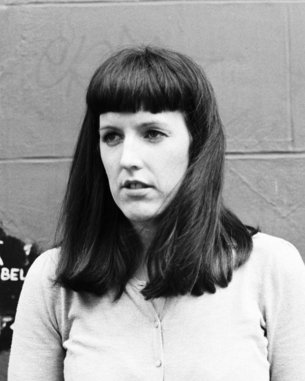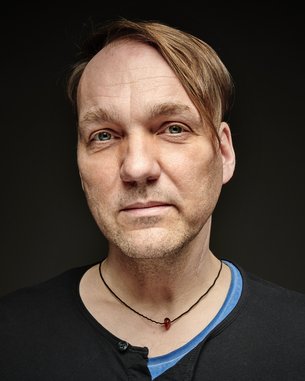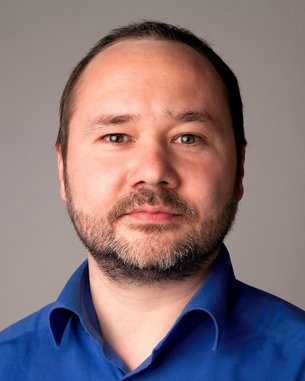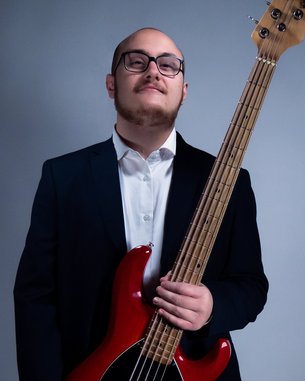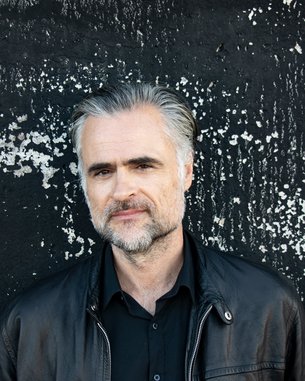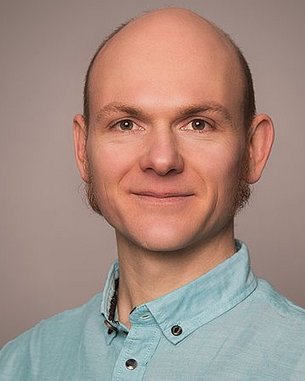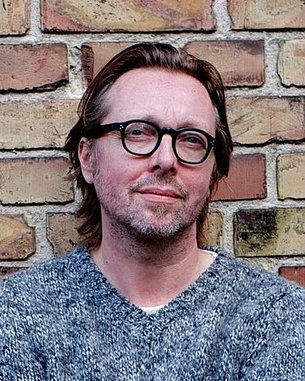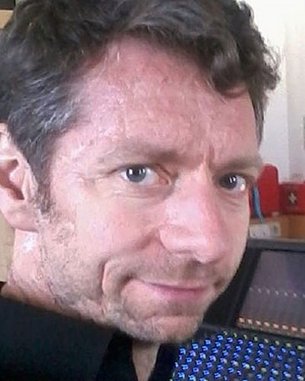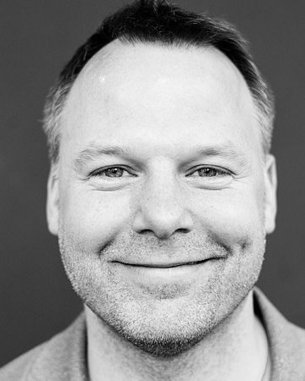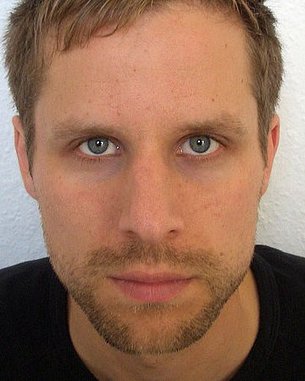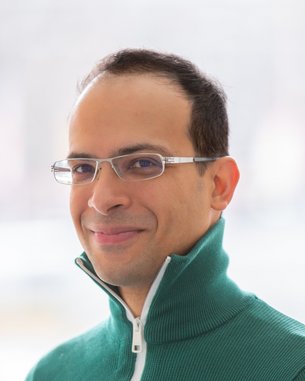Sound engineering, capturing, mixing - is that exactly your world? Our degree in Audio Design teaches you how to acoustically shape the world with sound and speech - from blockbuster soundtracks to electric car sound design.
Audio Design
- Bachelor of Arts (B.A.)
- 7 Semesters
- on campus
- 210 ECTS
- €790/Month
- No foundation year necessary
- In accreditation
- university cooperations
- Full time
- German / English
- summer & winter semester | SRH Gera collaboration
- stay abroad
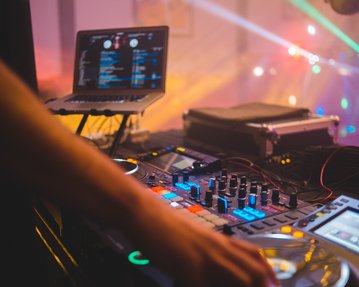
YOUR COURSE CONTENT
Experiment, compose, produce...Designed sound surrounds us in almost all areas of our lives. In this programme you will explore the physical properties of sound and learn how to technically design and manipulate it. You will produce soundtracks for various media such as film, animation and computer games, you will investigate the powerful effects of sound in different environments and become familiar with the entire acoustic communication chain - from the sound source to the recipient.
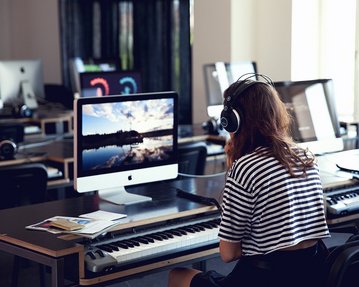
YOUR CAREER PROSPECTS
Sound engineer, DJ and moreAudio designers compose music of various genres, create digital sound designs and acoustic special effects, realise speech productions and manage sound recordings with bands and ensembles. They write songs, orchestrate their own arrangements and develop digital musical instruments and apps. Audio designers work either freelance or are employed in a variety of industries.
The B.A. Audio Design offers excellent career opportunities in industries such as:
- Phono industry, labels, studios
- Advertising, media and design agencies
- Audio software companies
- Production companies, TV and radio stations, radio play publishers
- Game producers
They work, for example, as:
- Sound designers
- Music producers
- Audio engineers
- Film musicians
- Composers
- Software developers
- Product managers
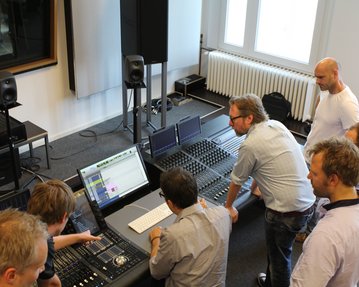
Impressions from our Sound Lab
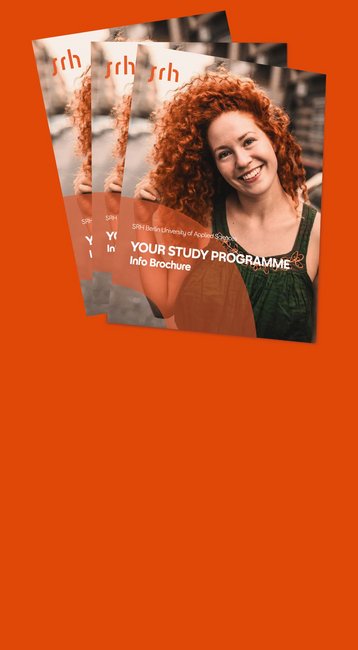
Study programme brochure and more ...
Discover your future in music with us
Steps Ahead
Hearing your own song on the radio or in advertising, signing with a label: The "Steps Ahead" Listening Session at the Berlin School of Popular Arts offers young talents the opportunity to get a few steps closer to this goal. Musicians get to meet decision makers from the music industry and media in person. Thanks to the direct feedback, our students get the chance to get their song on radio or to sign a contract.
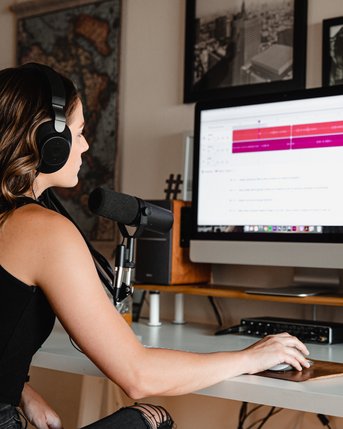
Joint concept albums with UCA students
Students of the SRH Berlin Audio Design programme and students of the English University for the Creative Arts have created concept albums together using the digital audio workstation Soundtrap. The aim of the project is to create a creative network beyond borders and to strengthen the students' intercultural skills.
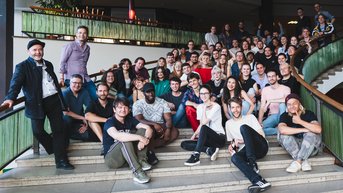
SOPA Bandcamp
First successful SOPA Bandcamp at the Landesmusikakademie Berlin with lots of great moments and many enriching impressions.
The Corona crisis is hitting the creative industries and the music scene hard.
How are artists able to strengthen their resilience, find new impulses and use the crisis as an opportunity?
SOPA Sessions
Your curriculum
Basics - Theory & Practice I
-
Studio I - Recording & Acoustics
5 -
Musical Analysis / Music Design I
5 -
Lab I - Studio Composition
5 -
Practical Project I
5 -
Introduction to Sound Design
5 -
Pop Music History
5
In the first semester you will immerse yourself in the world of Audio Design. You will learn basic techniques of audio engineering, miking and recording. You'll also learn about the physics of acoustics and you'll be introduced to common DAW systems (Logic, Pro Tools, Ableton Live). In your first practical projects, you will learn how to dramaturgically build up your own pieces, to implement them compositionally and technically and to change their effect through sound design. In addition to a first excursion into popular music history, you will receive piano lessons to improve your routine on the instrument for your own compositional work.
Basics - Theory & Practice II
-
Music Design II
5 -
Lab II - Sound & Music Design
5 -
Elective I
5 -
Practical Project II
5 -
Digital Signal Processing – Sound Synthesis & Effects
5 -
Sound Studies
5
In the second semester you will deepen your knowledge of music theory and practice. In the Sound Studies module you will analyse sound design, musical concepts and pieces and receive an introduction to scientific work. You will learn the basics of digital signal processing and apply your knowledge in first sound synthesis procedures. In the second semester you will also carry out a practical project (e.g. with students of the B.A. Visual and Interactive Media).
Applied Basics I
-
Composition I - Electronic Music
5 -
Lab III - Audio design
5 -
Studio II - Editing & Mixing
5 -
Practical Project III
5 -
Music Informatics
5 -
Media Law (Music & Sound)
5
In the third semester you will develop your own compositions and analyse current works. You will deal with the basics of music production and get to know the everyday studio life of an audio designer, design software-based musical instruments and interfaces. The Media Law module also teaches copyright law, trademark law and licensing.
Applied Basics II
-
Digital Scoring
5 -
Studio III - Mastering & Mixing
5 -
Elective II
5 -
Practical Project IV
5 -
Sound Agency
5 -
Language OR Physiology / Prevention
5
In the fourth semester you will learn the basics of arranging and hone your compositional skills. Also on the timetable: mastering, audio mixing and post-production in the studio.
Internship or Study Abroad
In the fifth semester, you can take an internship at home or abroad or study abroad. The scope corresponds to a student workload of 750 hours each and is credited with 30 CP.
Specialisation & Practice I
-
Lab IV - Sound & Space
5 -
Instruments, Interfaces & Installations
5 -
Elective III - Dept. Music & Sound
5 -
Practical Project IV
5 -
Focus Project I – Interdisciplinary
5 -
Creative Strategies & Project Organisation
5
In the sixth semester you decide on a project from the fields of music technology & art, music production, sound design or composition and thus choose your individual focus. Your focus project will be carried out in cooperation with the degree programs B.A. Visual and Interactive Media and B.A. Creative Industries Management. You will learn to develop instruments and interfaces and dive into production techniques for 3D audio mixes and multi-channel systems. Building on this, you will consolidate your knowledge in a self-chosen module from the field of sound: music technology or sound design. Accompanying guest lectures and field trips will give you important stimuli from the industry and the opportunity to learn from the experiences of others.
Specialisation & Practice II
-
Game Audio / Film Music
5 -
Elective IV - Dept. Music & Sound
5 -
Focus Project II – Individual
5 -
Competence Transfer
5 -
Bachelor's Thesis
10
Again, you choose a focus project, but now you carry it out independently as an individual project. A further specialization in the areas of game audio, film music & dramaturgy is possible. In addition, you will pass on your knowledge to younger semesters: in self-led basic courses you will train your didactic and pedagogical skills. At the end of the semester you will write your bachelor thesis.
Contraction - A project by Maximilian Weber
We help you achieve your goals
Our requirements
Admission requirements vary according to the educational background and citizenship of all applicants. Our admission requirements are in accordance with German legal stipulations.
The basic requirements are:
- General higher education entrance qualification (Abitur) or university of applied sciences entrance qualification (Fachhochschulreife). In case you have not graduated yet, please apply with your existing transcripts or your latest interim certificate. However, we need your final degree certificate before you can start your studies.
- Please note that applicants with foreign degrees might be eligible for direct entry. This means that applicants who meet the requirements DON'T need to do a foundation year before starting their Bachelor's.
- CV
- Artistic works: three one-minute MP3s as independent artistic works
- Proof of English language proficiency
- Copy of your identity card or passport
You do not qualify for direct entry? Join our preparatory course and get qualified to start your Bachelor’s degree at SRH.
Next available courses
- February 2024
- October 2024
After a successful pre-selection we will invite you to a practical entrance examination at the Berlin School of Popular Arts. The aim is to get to know your course-specific expertise, your creativity, your willingness to create and to express yourself and your motivation.
I) Details MP3s
Please upload the following MP3s with your application:
- Piece: the first fragment can be selected freely. It could be an electronically produced music track, a sound logo or a production by a band or artist that has been sound-edited by the applicant.
- Piece: the second fragment is an electronically produced piece. The genre can be selected freely. The focus of the evaluation is on the melodic/harmonic elements within the composition. The following production techniques are undesirable:
- classical remixes
- medleys
- use of vocal stems
- use of pre-produced loops that were not clearly recognisable and were processed in a creative way
- exclusive use of sample-based material without the inclusion of sound synthesis procedures/synthesisers
- Piece: create a sound environment that surrounds (real) or could surround (fictitious) someone in one place. Choose a meaningful title for the sound file.
Please assemble the three music fragments in MP3 format according to the above order. In addition, please create an informal PDF file the size of one page, which briefly describes your tracks.
II) Details entrance examination:
The entrance examination includes a ten-minute practical presentation and a personal interview with two professors/lecturers. In the ten-minute audition you will present two music/sound pieces of your choice, related to the core areas of digital music production/sound engineering and composition/musical arrangement. Proof of artistic/aesthetic/technical aptitude for the course of study must be provided in these two areas.
There is also a test of your sound engineering, music theory and aural training skills. The following questions can be asked and will help you with your preparation:
- In which key is the piece you have just presented?
- Name different intervals (distances between two tones) within an octave
- What is the difference in music theory between major and minor?
- Play a major chord/minor chord on the piano
- Which triadic chords are there besides major and minor?
- Determine the intervals played on the piano by ear
- Determine the triads played on the piano with regard to their tonal gender by ear
- Explain the mode of operation using the individual adjustable parameters of effect devices such as gate, compressor, reverb, EQ, filter! Examples: what happens if you reduce the "threshold" of a compressor?
- What happens if you increase the "predelay" of a reverb?
- Explain the mode of operation and the individual parameters of a synthesiser. Examples: what does an "LFO" do?
- What changes if you increase the "attack" value of a volume envelope?
The access check takes 30 minutes in total.
III) Language requirements
Here are the English requirements that you should bring along:
- TOEFL 87 ibt (direct entry)
- TOEFL 79 - 86 ibt (with additional agreement)
- TOEIC 785 (Listening/Reading 785, Speaking 160, Writing 150)
- IELTS/ IELTS ONLINE (academic) 6.5 on average - please see Language Centre guidelines if results differ
- CAE (grade A, B, or C)
- CPE (grade A, B or C)
- Pearson English Test Academic (PTE-A) 59 points
- Linguaskill: 176 - 184 (CES) - all four skills required
- Duolingo 110 points

Your tuition fees
As a state-recognised, private university, the SRH Berlin University is financed by tuition fees. These revenues go towards equipping our campus, providing services for our students, and quality assurance. In this way we ensure that you receive the best possible education under optimal study conditions.
Tuition fees (per month or per semester)
- EUR 790 / month (Citizenship EU/EEA incl. Switzerland, Western Balkans and Ukraine)
- EUR 4,740 / semester (Citizenship non-EU/non-EEA)
Enrolment fee (once)
- EUR 750 (Citizenship EU/EEA incl. Switzerland, Western Balkans and Ukraine)
- EUR 1000 (Citizenship non-EU/non-EEA)
The monthly/semester tuition fees remain the same for the entire duration of the study programme. More information about our fees.
You can finance your advertising studies through BAföG, student loans, education funds and scholarships. The possibilities vary according to nationality. You can find more information under "Financing your studies". Our Student Advisory Service will be happy to answer any questions you may have.
Application process and deadlines
Please find the Application and Late Arrival deadlines here.
We look forward to getting to know you. This is our application process:
- You apply online at our SRH Universities Application Portal
- If you meet the admission requirements, we will invite you to an entrance examination
- If your entrance examination is successful, you will receive an acceptance letter and the study contract
- You will sign the study contract and send it back to us
- You will pay the registration fee
- We will prepare your letter of admission for you
- You take part in our Welcome Week and then it begins!

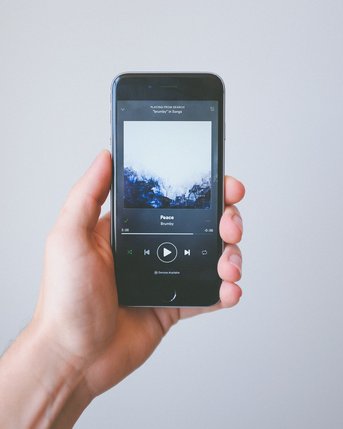
Berlin School of Popular Arts (SOPA) on Spotify
In our SOPA Playlist we present current and former students from the study programmes BA Music Production, BA Audio Design and BMus Popular Music. All songs were either (co-)composed, interpreted, arranged and/or produced by our students!
